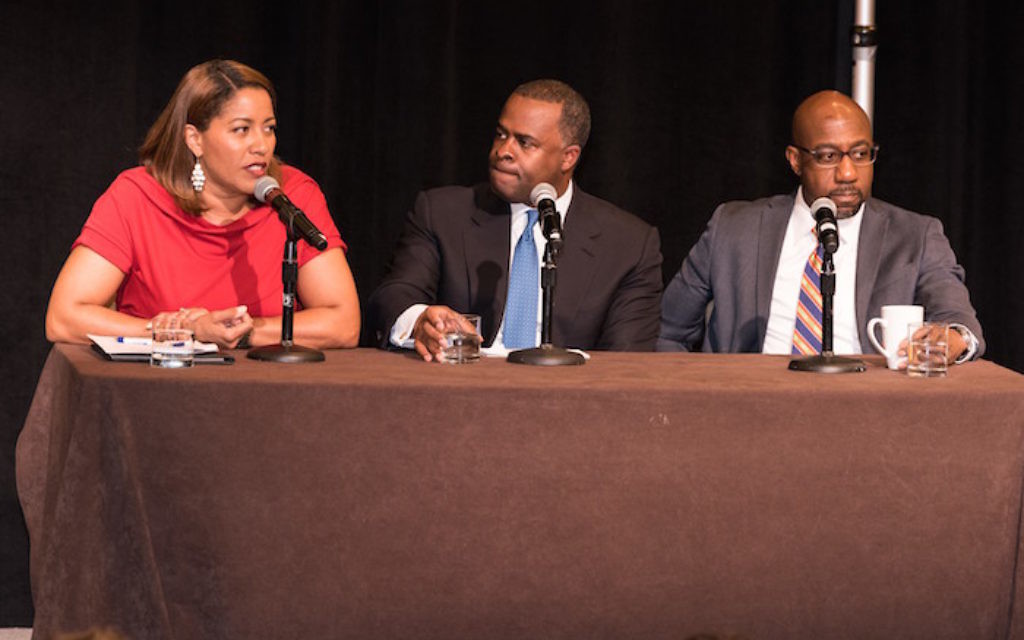Reform Rabbis Hear Call to Justice
The CCAR convention focused on “being a rabbi in turbulent times,”

Jewish Atlanta buzzed with activity from March 19 to 25 as the city hosted four major Jewish conferences that attracted hundreds of rabbis, community leaders, philanthropists and innovators from around the country.
While the Jewish Funders Network, The Collaboratory and the National Council of Jewish Women convened at Buckhead hotels, the Central Conference of American Rabbis gathered in Midtown at the Loews Atlanta. The CCAR’s 128th convention attracted 550 rabbis from the Reform movement, including the largest-ever delegation of Israeli Reform rabbis to the United States.
The visitors’ overwhelming response to Atlanta is that we are a city of impressive growth with a notable history that is particularly relevant to our times.
Get The AJT Newsletter by email and never miss our top stories Free Sign Up
The CCAR convention focused on “being a rabbi in turbulent times,” a theme based on members’ most urgent concerns. All the professional sessions were closed to the media so the rabbis could feel safe to discuss issues of ethics, as well as spiritual and leadership challenges.
The overarching tone of many of the CCAR events and panels was geared toward facilitating conversation about how to lead politically divided communities with courage and hope.
In the context of this year’s theme, the CCAR convention was fortunate to be in Martin Luther King Jr.’s hometown, with its rich civil rights history and with no shortage of contemporary faith leaders who deal with adversity as a matter of course.
One public panel symbolic of the intention to inspire was a conversation among Atlanta Mayor Kasim Reed and two pastors from King’s spiritual home, Ebenezer Baptist Church, the Rev. Raphael Warnock and the Rev. Natosha Reid Rice.
Reed joked that he was “swimming in the shallow end” as a politician among religious scholars whose eloquent narratives brought the audience into deeper waters. But the weaving of political and clergy perspectives was an example of theology becoming animated in the practice of life.
Warnock, who has a close friendship with The Temple’s senior rabbi, Peter Berg, reminded the audience about the continued relevance of the first motto of the Southern Christian Leadership Conference, led by King in the 1950s: “to redeem the soul of America.”
Warnock recognized that people are easier to reform than institutions and emphasized the importance of private actions in “broadening communal space so that everyone can breathe.”
The all-Christian panel shared a language with the Reform rabbinic crowd, seamlessly moving through Old Testament and prophetic texts while also quoting Toni Morrison, Maya Angelou and Abraham Joshua Heschel. The speakers understood their audience and were careful to sidestep theological differences, choosing to focus instead on shared black and Jewish history as American minorities, including the participation of Jews in the civil rights movement.
A noticeable pivot took place when Warnock raised the subject of America as the mass incarceration capital of the world. He called for an interfaith alliance to stand together and “do justice, not just contemplate justice.”
Reed, an early and active supporter of Hillary Clinton’s presidential campaign, was unabashedly partisan in his evaluation of the Trump administration as one that “disrespects clarity,” and he urged faith communities to uphold a framework of integrity that keeps politicians accountable.
Reid Rice encouraged the rabbis to “be willing to fight for the people who don’t look like you.”
Warnock called it an interfaith moment, recalling King’s words that we are all “tied in a single garment of destiny. Whatever affects one directly affects all indirectly.” The overwhelming feeling in the room was of camaraderie, hope and inspiration..




comments